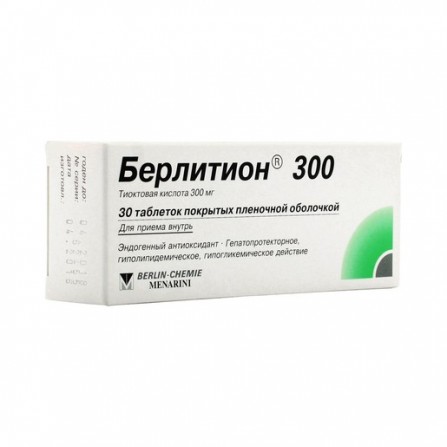Berlition 300 pills 30 pcs
Condition: New product
1000 Items
Rating:
Be the first to write a review!

More info
Active ingredients
Thioctic acid
Release form
Pills
Composition
1 tab.: Thioctic acid 300 mg. Auxiliary substances: lactose monohydrate - 60 mg, croscarmellose sodium - 24 mg, colloidal silicon dioxide - 18 mg, microcrystalline cellulose - 165 mg, povidone (K-30) - 21 mg, magnesium stearate - 12 mg. Shell composition: Opydray OY-S-22898 yellow - 12 mg (hypromellose - 6.597 mg, titanium dioxide (E171) - 3.9134 mg, sodium lauryl sulfate - 0.7096 mg, liquid paraffin - 0.676 mg, dye quinoline yellow (E104) - 0.075 mg, sunset sunset yellow dye (E110) - 0.029 mg, liquid paraffin - 3 mg).
Pharmacological effect
Thioctic (α-lipoic) acid - an endogenous antioxidant (binds free radicals), is formed in the body during the oxidative decarboxylation of α-keto acids. As a coenzyme of mitochondrial multienzyme complexes, it participates in the oxidative carboxylation of pyruvic acid and α-ketoacids. It contributes to a decrease in blood glucose and an increase in glycogen content in the liver, as well as to overcome insulin resistance. By the nature of the biochemical action is close to the vitamins of group B. Participates in the regulation of lipid and carbohydrate metabolism, stimulates the metabolism of cholesterol, improves liver function. It has a hepatoprotective, hypolipidemic, hypocholesterolemic, hypoglycemic action.
Pharmacokinetics
Absorption and distribution After ingestion, thioctic (α-lipoic) acid is rapidly and completely absorbed from the gastrointestinal tract. Food intake reduces absorption. Time to reach Cmax - 40-60 minutes. Bioavailability - 30% .Vd - about 450 ml / kg. Metabolism and excretion. Has the effect of first passing through the liver. The formation of metabolites occurs as a result of side chain oxidation and conjugation. Thioctic acid and its metabolites are excreted in the urine (80-90%). T1 / 2 - 20-50 min. Total plasma clearance - 10-15 ml / min.
Indications
- diabetic polyneuropathy; - alcoholic polyneuropathy.
Contraindications
- children's age (efficacy and safety have not been established); - pregnancy (there is not enough experience with the drug); - breastfeeding (not enough experience with the drug); - hypersensitivity to the components of the drug.
Precautionary measures
Do not exceed recommended doses.
Use during pregnancy and lactation
The use of Berlithion 300 during pregnancy and lactation is contraindicated due to the lack of sufficient clinical data confirming the safety and efficacy of the drug in this category of patients.
Dosage and administration
Inside appoint 600 mg (2 tab.) 1 time / day. Tablets are taken on an empty stomach, approximately 30 minutes before the first meal, without chewing and drinking plenty of liquid. The duration of the course of treatment is determined by the doctor individually.
Side effects
On the part of the digestive system: possible (after ingestion) - dyspepsia, incl. nausea, vomiting, heartburn. Metabolism: hypoglycemia (due to improved glucose uptake). Allergic reactions: in some cases - urticaria.
Overdose
Symptoms: headache, nausea, vomiting. Treatment: symptomatic. There is no specific antidote.
Interaction with other drugs
In vitro, thioctic (α-lipoic) acid interacts with ionic metal complexes (for example, cisplatin). Therefore, while taking it, it is possible to reduce the effect of cisplatin. After taking the drug Berlition 300 in the morning, it is recommended to use iron, magnesium and dairy products (due to their calcium content) is recommended after dinner or in the evening. When used simultaneously, ethanol and its metabolites can reduce the therapeutic activity of thioctic (α-lipoic) acid. When used simultaneously, Berlithion 300 enhances the hypoglycemic effect of insulin and oral hypoglycemic agents.
special instructions
The solution of the drug should be protected from exposure to light, for example, using aluminum foil. Protected from light, the solution can be stored for about 6 hours. Patients with diabetes mellitus require constant monitoring of the concentration of glucose in the blood, especially at the initial stage of therapy. In some cases, it is necessary to reduce the dose of insulin or oral hypoglycemic drug to avoid the development of hypoglycemia. Patients taking the drug Berlition 300, should refrain from alcohol.




